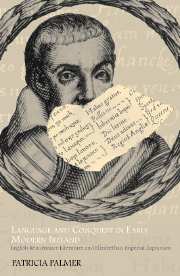 Language and Conquest in Early Modern Ireland
Language and Conquest in Early Modern Ireland Book contents
- Frontmatter
- Contents
- Acknowledgements
- List of abbreviations
- Introduction
- Chapter 1 Conquest, colonial ideologies and the consequences for language
- Chapter 2 ‘A bad dream with no sound’: the representation of Irish in the texts of the Elizabethan conquest
- Chapter 3 ‘Wilde Speech’: Elizabethan evaluations of Irish
- Chapter 4 ‘Translating this kingdom of the new’: English linguistic nationalism and Anglicisation policy in Ireland
- Chapter 5 New world, new incomprehension: patterns of change and continuity in the English encounter with native languages from Munster to Manoa
- Chapter 6 The clamorous silence
- Conclusion
- Glossary
- Notes
- Bibliography
- Index
Chapter 6 - The clamorous silence
Published online by Cambridge University Press: 22 September 2009
- Frontmatter
- Contents
- Acknowledgements
- List of abbreviations
- Introduction
- Chapter 1 Conquest, colonial ideologies and the consequences for language
- Chapter 2 ‘A bad dream with no sound’: the representation of Irish in the texts of the Elizabethan conquest
- Chapter 3 ‘Wilde Speech’: Elizabethan evaluations of Irish
- Chapter 4 ‘Translating this kingdom of the new’: English linguistic nationalism and Anglicisation policy in Ireland
- Chapter 5 New world, new incomprehension: patterns of change and continuity in the English encounter with native languages from Munster to Manoa
- Chapter 6 The clamorous silence
- Conclusion
- Glossary
- Notes
- Bibliography
- Index
Summary
One hand to an ear for the vibration,
The far wires, the reverberation
Down light-years of the imagination.
Derek Mahon, ‘Aran’Fínghin Mac Carthaigh Reagh/Florence MacCarthy, the Lord of Carbery whose duality stung Carew into styling him ‘the Machiaevellian ambodexter’ (Stafford, Pacata Hibernia i, p. 118), spent the last thirty years of his life detained in London. He passed his long years of confinement seeking the redress of English law and shoring fragments against the ruin of the culture which he had tried, unsuccessfully, to reconcile with the new order. He sought to interest the new men, focused only on an anglicised future, in the Gaelic past. MacCarthy wrote to the poet, Fear Feasa Ó an Cháinte, in about 1602. Curiously, the letter, found among Cecil's papers, is written first in Irish and then, with the transition ‘Which in English is …’, in translation, like a specimen parallel-text. He tells Ó an Cháinte – who spoke no English – that, to solace ‘thouermuch melancholie’ of his confinement, he has resolved
to write somewhat in Ireish for the queenes Majestie, which I do purpose, to the end she may understand it, to cause the whole somm of the matter … to be put in English, by the help of my frends here, that are skillful and learned in their owne languadge (De Brún, ‘Litir’, p. 52)
and he summons the file to assist him.
- Type
- Chapter
- Information
- Language and Conquest in Early Modern IrelandEnglish Renaissance Literature and Elizabethan Imperial Expansion, pp. 173 - 211Publisher: Cambridge University PressPrint publication year: 2001


